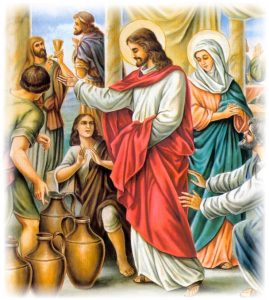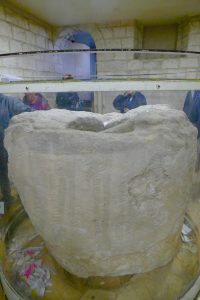Transformative Faith
(Isaiah 62:1-5; Psalm 96; 1 Corinthians 12:4-11; John 2:1-12)
*********************************************************
Cardinal John Henry Newman once said, “To live is to change; to have lived well is to have changed much.”
My brothers and sisters, pray for transformative faith in Jesus.
We have just completed the Christmas season and today are celebrating the second Sunday of Ordinary time. The gospel for today, however, assures us that no time is ordinary when we believe in Jesus. Humble genuine faith in Jesus involves us in an extra-ordinary process of daily, continual transformation.
The Old Testament reading for today and the Psalm provide us with a broad context for the gospel account. The prophet Isaiah proclaims a renewed Jerusalem (for us a Church) enjoying a marital relationship with God. The Psalm speaks of God’s marvellous deeds we know are accomplished in Christ. The gospel then shows us Christ in action, transforming water into wine.

This passage from the gospel of John is layered with meaning. Let us examine some of the highlights. First, there is mention this event happens on the third day, pointing to the end of the gospel where Jesus will rise from the dead on the third day. This passage, then, alludes to the newness of life Jesus will bring about by his death and resurrection, the Paschal Mystery.
Second, John points out very deliberately that Mary, the mother of Jesus, was there. Her role is pivotal in this first of Jesus’ miracles. As Mary was present at the foot of the cross, where Jesus sheds his blood for us, so she is present here, where he transforms water into wine so that we might believe in him.
The fact that he addresses her as “woman” alludes to the fact that she is the new Eve, the mother of a new creation that reverses the fall of humanity. It also allows her to step back from her role as the mother of Jesus, so that she can step forward into her new role as the first and perfect disciple, the one who first believes in Jesus and who helps the other disciples also believe in him. “Listen to him; do what he tells you,” are her words not only to the servants, but also to us as his disciples today.
![]()
Third, the fact that there are six water jars resonates with Hebrew numerology seeing the number six as a very weak number that never makes it to seven. The old wine of the Old Testament is depleted. The meaning here is the old rituals and religion of the Jews can never transform humanity; this number points to the possibility of a seventh jar – fullness and perfection, who is Jesus himself, initiating a new creation.

Stone jar at Cana
Later in the gospel, at another table, Jesus invites us to be grafted onto another source of life, joy, beauty, covenant, and energy – Jesus himself, he who is the real vine. Grafted unto this vine, we will have within us the potential to produce fruit in and out of season, tapping into the seventh jar.
The use of these water jars indicates the old ways of ritual purification are being fulfilled by the inner transformation the Spirit of Jesus will bring. The drinking of wine in that culture did not have the association with alcoholism and alcohol abuse it does today. Jesus’ provision of an ample amount of wine puts him in the place of a host, generously and graciously providing “new wine of inner transformation” for his guests, those who will believe in him.
This new, choice, finest of wines Jesus gives, totally transforms the old water of formalized religion into a relationship with God characterized by joy and abundance. Everything is meant to emphasize the extravagance of the miracle about to take place.
New wine is created in the “old” vessels of the Jewish purification rites, symbolizing that the old forms are given new content. This miracle is neither a rejection nor a replacement of the old, but a fulfilment of the old through the creation of something new in the midst of Judaism. The extravagant proportions here anticipate the extravagant proportions of the feeding of the five thousand.
Fourth, the reference to it not being his time is a clear reference by Jesus to his hour on the cross where he will accomplish the Father’s will to show us the depth of the Father’s love. It also asserts that nothing will dissuade Jesus from his mission to do only the Father’s will.
Following Jesus through the paschal mystery transforms us. Jesus never said, “Worship me.” He consistently said, “Follow me.” That is why Jesus answers so mysteriously to Mary’s request. He was saying, “You want a miracle. The real miracle is not turning water to more wine; it is the cross and resurrection, his hour, his moment of total obedience to the Father out of love.
Do we dare to follow Jesus through passion, death, resurrection, appearances, ascension and Pentecost in our own lives? That means dealing with the hurts in our lives through forgiveness, and facing the loss in our lives through grieving and letting go. It means surrendering our lives to him; letting him truly be our Lord and Saviour.
Someone who has undergone a deep transformation through faith is Jonathon. A government worker, he had suffered for years working under a racist boss who tried every trick in the book to get him fired, just because he was Indigenous. On the way to a Cursillo one day, Jonathon started to have second thoughts, and headed south to the nearest city instead. Just then the song, “The Old Rugged Cross” came on the radio, and for some reason, Jonathon started to cry. The song touched his heart. He decided to turn back and go to the Cursillo after all. There, through the talks, prayer, fellowship and celebration of reconciliation, he learned all about forgiveness. He thought about his racist boss who for eight years had tried to make life miserable for him and kept looking for a way to fire him. For the first time, he was able to understand the man was sick and prejudiced, and was able to let go of his anger towards him. When Jonathon got home, he phoned his boos, thanked him for making life miserable for him, and told him that he forgave him. His boss was silent and couldn’t even say a word, but the next Sunday, he was in church for the first time in years.
It is worth noting that the two miracles of transformation (wine into water, and the multiplication of bread and fish) placed near the beginning of the gospel of John speak of the Eucharist as the central sacrament of transformation.

Tabernacle Our Lady of Mt Carmel
In fact, it is by really living out two sacraments – our baptism and the Eucharist, that we will be transformed. The water of baptism and the wine of the Eucharist are powerful symbols today calling us to really, sincerely, live out our baptism and the Eucharist in our lives, and we will be transformed into other Christs.
So, to experience the new wine of the Kingdom of God, pray for transformative faith in Jesus.




When we are baptized with water ; we are part of God and children of God. We are part of this Catholic community that had created. Also , receiving the Holy Commmunion or the Eucharist is receiving Jesus Christ and his experience. During Eucharist ministry Jesus transforms the bread and wine into the body and blood of Christ. Jesus is present inside the Eucharist and he will be forgiving us and healing us from the inside. He will answer any prayer intentions and any concerns we have. So, we are to surrender ourselves to the Lord ; give him permission to do what he wants with us. This is living out his word by offering ourselves to God ; so we can experience the new wine the kingdom of God. Oh yes, I am willing to follow Jesus through his passion, death, resurrection, appearances, Ascension and the Pentecost. I do dare because I have nothing to hide , I rather be forgiven and willing to forgive other people who have hurt me. Asking God to heal me from any sickness through physical and emotional pain over the years. We are to repent and change our behaviour and actions because we know what we did wrong . Lastly, we are to have forgiveness and love towards other people and love God the same way. Amen.
Thanks Bishop Sylvain Lavoie for all those lovely words and speeches . Thanks for sharing all those pictures. I would like to get away from this cold weather. You should take me with you. You are Blessed to write so many homilies and books for all of us. Gracias! Take care .